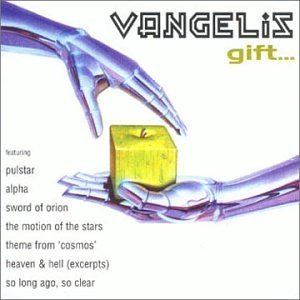

They are expanded upon with other sonorities in "Jupiter Rex," as choral voices wind around bells, chimes, rumbling drums, dissonant winds, brass, and strings. Dissonance entwines with majesty on "Zeus Almighty," offering a processional atmosphere and dramatic tone clusters. When she sings, the heavens open and pathos, desire, and longing pour out. Her full operatic power is realized on "Hera/Juno: Queen of the Gods." It commences with sparse, plucked harp sounds, in call-and-response with a taut ambient backdrop that slips in amid reverbed strings, piano, and synth. They emerge from ether amid space blips, alien sounds, a droning cello, and a lone sequencer as the tension of the unknown meets awe and wonder. "Juno's Ethereal Breeze" offers her multi-tracked vocals as a chorale. "Juno's Tender Call" is a ghostly yet deeply moving interlude that features Gheorghiu's gorgeous soprano wordlessly singing above chamber strings and woodwinds, harp, and sweeping piano. "Juno's Quiet Determination" features a subdued, wordless vocal chorus stitched inseparably to restrained, painterly instrumentation, but eventually reaches a dramatic conclusion to introduce the symphonically dynamic "Jupiter's Intuition." "Space's Mystery Road" commences with a snare shuffle as strings, analog synths, and helicopter sounds emerge under an acoustic piano to deliver a noirish theme with seemingly sinister intent. She plays the voice of mythological Greek goddess Juno (aka Hera) as she pierces the clouds concealing Jupiter (aka Zeus). Vangelis' only accompanist on the date is operatic soprano Angela Gheorghiu. "Out in Space" recalls the Blade Runner score with cascading synths, open-toned brass and winds, tympani, and analog electronics. "Inside Our Perspectives" offers sweeping layers of electronics, percussion, loops, and orchestral sounds in pulsed and plotted cadences that alternately evoke the Orb, Ultramarine, and mid-period Tangerine Dream. "Atlas' Push" samples various sounds from the launch event amid massive ambient textures. The album is inspired by NASA's launch of space probe Juno to Jupiter in 2011 - now extended until 2025 - to explore the planet's atmosphere, undersurface, and many moons. Five years on, Juno to Jupiter returns to Vangelis' career-long obsession with space exploration. The composer returned with 2016's conceptual Rosetta, based on the ESA (European Space Agency) mission that landed a probe on the comet 67P/Churyumov-Gerasimenko. He issued soundtracks for the films El Greco and Paris 1968, but no solo albums. After releasing the choral symphony Mythodea: Music for the NASA Mission - 2001 Mars Odyssey in 2001, composer and multi-instrumentalist Vangelis Papathanassiou went on a recording hiatus for 15 years.


 0 kommentar(er)
0 kommentar(er)
